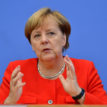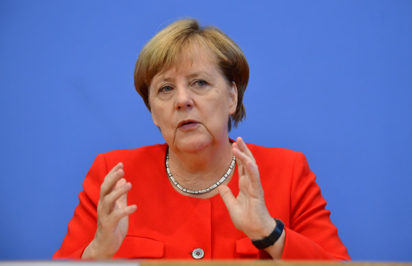

German Chancellor Angela Merkel’s conservative Christian Democrats (CDU) suffered historic losses in two key state elections on Sunday with the results likely to shape the political landscape in the build-up to September’s national poll.
While the CDU vote slumped to 23.1 per cent in the south-western state of Baden-Wuerttemberg, the party’s support in neighbouring Rhineland-Palatinate dropped to 26.5 per cent, according to poll projections by public broadcasters ZDF and ARD.
Sunday’s votes are expected to help determine Merkel’s successor as well as set the stage for a slew of regional and state polls that culminate in the federal election in six months.
“This is not a good election night for the CDU,” party General Secretary Paul Ziemiak said after the CDU recorded its worst results ever in the two states.
Ziemiak said the votes reflected a growing resentment, incomprehension and impatience among the population about the management of the coronavirus crisis, with support for the CDU also sliding at the national level.
Voters went to the polls on Sunday against the backdrop of steady rise in Covid-19 cases along with a shambolic vaccine rollout and a political scandal over medical mask procurement that has shaken the CDU.
The elections resulted in the environmental Green Party’s sometimes irascible Winfried Kretschmann securing a third term as premier of Baden-Wuerttemberg after winning 30.9 per cent of the vote compared with 30.3 per cent in the last poll in 2016.
However, party officials warned that the election results may change because of the large number of postal votes.
READ ALSO: AstraZeneca says no evidence of clot risk as more vaccinations halted
The 72-year-old Kretschmann swept to power in Baden-Wuerttemberg a decade ago following the Fukushima nuclear disaster.
Once a CDU political stronghold, Baden-Wuerttemberg is also home to some of Germany’s biggest corporate names such as Mercedes Benz, Hugo Boss, Robert Bosch and Porsche.
The popular Social Democratic (SPD) premier Malu Dreyer was also returned to power in Rhineland-Palatinate with 34.2 per cent, down from the 36.2 per cent the secured by the SPD in 2016 in the state, which is a centre of the nation’s wine industry.
The 60-year-old Dreyer’s win extends the SPD’s 30-year-grip on her state and helps to boost the September election campaign of the SPD’s chancellor-candidate Olaf Scholz, who is also finance minister in Merkel’s CDU-led government in Berlin.
Olaf Scholz described the state election results as “a good day” for his party, adding that his hopes of becoming chancellor had “also became visible today.”
However, support for Dreyer’s state-level SPD is about double what the SPD currently garners in national opinion polls.
Sunday’s twin election results also raised a range of possible coalition models for Berlin after September’s national election, including a CDU-led coalition with the Green Party or a new three-party alliance.
All parties have rejected teaming up with the far-right Alternative for Germany, which saw its vote drop in both states.
After nearly 16 years in power, Merkel has ruled out spearheading the conservatives’ campaign in September, which will be the climax of the country’s so-called super election year.
Merkel’s CDU and its Bavarian-based Christian Social Union (CSU) allies now have to decide who will be crowned the CDU-CSU chancellor-candidate for September’s election. This is now likely between April 1 and late May.
But Sunday’s votes represent a major setback for Armin Laschet, the newly elected CDU head, who has hopes of succeeding Merkel.
As the CDU chairman, the 60-year-old Laschet, who is also premier of Germany’s most populous state, North Rhine-Westphalia, could be expected to lay claim to head up the CDU-CSU September campaign.
But Laschet is facing a challenge from Bavarian state premier and CSU party chief Markus Soeder, whose tough coronavirus crisis management has earned him strong backing from CDU-CSU party members as well as the wider electorate to succeed Merkel, according to opinion polls.
The 54-year-old Soeder has, however, remained coy about his Berlin ambitions, regularly insisting that his political home remains in Bavaria.
Vanguard News Nigeria
The post Merkel’s state election losses could shape national political agenda appeared first on Vanguard News.











![[MUSIC] 2boyzino - Jinja](https://1.bp.blogspot.com/-JbJBlNSh1qs/YPK04mJfUpI/AAAAAAAAC7o/VxMHzy5pgPgeOP3B_-9v8xSz6vkTwNQDwCLcBGAsYHQ/w680/IMG-20210714-WA0053.jpg)




![[MUSIC]Musicman - DANGOTE PIKIN](https://1.bp.blogspot.com/-CQmwQL9r6nI/YNoh102FWbI/AAAAAAAAAgo/qBms4WwcG6c5abJhKy0KAzVlkADpmF-dgCNcBGAsYHQ/w680/InShot_20210627_202942865.jpg)







0 Comments
Advertise your business here at cheap rate and get large audience to your market. Call/Msg Teemikemedia: 07060733664 to get started.